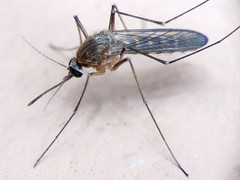 It's not simply the lack of rain or the surplus of water that may change our lives, but the ripple effects (so to speak) of any climate changes. Take this article from the San Francisco Chronicle.
It's not simply the lack of rain or the surplus of water that may change our lives, but the ripple effects (so to speak) of any climate changes. Take this article from the San Francisco Chronicle.
West Nile Virus is transmitted to humans by mosquitos, but is carried by birds. When dead birds are found in an area and examined for the virus, they tell epidemiologists that infection of local humans is likely.
We're used to associating mosquito proliferation with wet weather, but that's being proven a simplistic expectation. In California, the incidence of West Nile Virus is as high as it's ever been, while the state is experiencing the lowest precipitation since 1988. Scientists explain this by pointing to the fact that fewer watering holes means that more birds congregate in fewer locations, concentrating the population of carriers. Mosquitos find more targets in a smaller area, and consequently become more effective vectors to us humans.This has been a dry year in California. The Sierra snowpack survey in May found that snow levels were 29 percent of normal, the lowest since 1988. In addition to crowding birds and mosquitoes, the drought is also reducing the natural flushing of urban storm drains, causing stagnant puddles that are ideal breeding grounds for Culex quinquefasciatus, a variety of mosquito linked to many West Nile outbreaks.
Even the real estate situation seems to have a hand in it. Homeowners facing higher payments or foreclosure and looking to save money will first quit maintaining their swimming pools, thus creating perfect algae-covered breeding grounds for more mosquitos.In Kern County, half of all citizen complaints about mosquito swarms have been linked to neglected swimming pools that have turned green and become mosquito breeding sites.
Saturday, July 21, 2007
Wet or Dry, West Nile Doesn't Care
Subscribe to:
Post Comments (Atom)


No comments:
Post a Comment